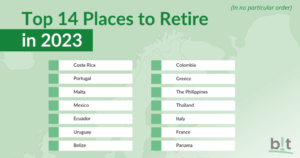Embarking on retirement in a foreign land is an exciting adventure, offering you the chance to explore new cultures and experiences. However, planning for healthcare insurance is a crucial step that ensures your golden years are worry-free. This guide provides essential tips on navigating healthcare insurance complexities, from understanding the local healthcare system to selecting the right insurance plan. By following these pointers, you’ll be well-prepared to enjoy your retirement abroad with peace of mind. Have you ever wondered how to manage healthcare insurance while retiring abroad? It’s a big decision that can feel overwhelming, but it doesn’t have to be. You might be dreaming of those sun-kissed beaches, charming European villages, or the rich culture of Southeast Asia. But planning for healthcare is crucial to make sure your journey abroad is as smooth as possible.

Check out our recommended retirement gifts!
Understanding Healthcare Options Abroad
One of the first steps you need to take when considering retirement abroad is understanding the healthcare options available to you. Different countries have different healthcare systems, ranging from public to private healthcare. Some countries boast world-class healthcare facilities, while others might not meet your expectations.
Public Healthcare Systems
Public healthcare systems, such as those found in the UK, Canada, and Australia, often provide affordable or even free medical services to residents. However, these systems may not always be accessible to non-citizens or those without permanent residency status. It’s important to research whether you’ll be eligible for these services in your chosen destination.
Private Healthcare Systems
Private healthcare systems, on the other hand, can often provide more immediate and specialized care, but this typically comes at a higher cost. Countries like the United States have a largely private healthcare system, and many expatriates choose to purchase private health insurance to help manage these costs.
Hybrid Systems
Some countries utilize a hybrid healthcare system, combining elements of both public and private care. For example, in France, healthcare is funded primarily through government schemes but individuals also often subscribe to private insurance plans for additional coverage.
Researching Healthcare Quality
Quality of healthcare varies widely from one country to another. When evaluating potential retirement destinations, look into the quality of local hospitals, the availability of specialists, and overall healthcare infrastructure.
World Health Organization (WHO) Rankings
The WHO provides rankings and reports on the health systems of countries worldwide. These can be an excellent resource to understand the quality of care you can expect.
Expatriate Communities
Expatriate communities can also be a goldmine of information. Online forums, social media groups, and local expat organizations often discuss healthcare quality and can provide firsthand accounts of their experiences.
Check out our recommended retirement gifts!
Deciphering Insurance Types Suitable for Expats
Understanding the types of health insurance available to expatriates is key to making an informed decision. Here are some options that may work for you.
Local Health Insurance
Purchasing a health insurance policy from your new country is often the most straightforward option. However, these policies are usually tailored to residents and might not cover you while traveling outside your new home country.
International Health Insurance
International health insurance provides coverage in multiple countries, making it a great option if you plan to travel frequently or split your time between different locations. These plans often include a higher level of service and can be customized to include or exclude coverage in your home country.
Travel Insurance
If you don’t plan on living abroad full-time, travel insurance can be a short-term solution. It usually covers emergencies and accidents, but often lacks the comprehensive coverage provided by more permanent options.
Comparing Insurance Options
Here’s a quick comparison to help you decide.
| Insurance Type | Coverage Area | Best For | Downsides |
|---|---|---|---|
| Local Health Insurance | Single Country | Long Term Residents | Limited or No International Coverage |
| International Health Insurance | Multiple Countries | Frequent Travelers, Expats | Costly |
| Travel Insurance | Multiple Countries (short term) | Short-term Stays, Holidays | Limited Coverage |
The Importance of Pre-existing Conditions
Pre-existing conditions can complicate your health insurance policy. Many insurers either exclude coverage for these conditions or charge higher premiums.
Disclosures and Assessments
When applying for a new policy, you must disclose any existing health conditions. Insurers will assess the risk and may decide to offer modified coverage. Some international policies, however, might offer coverage plans specifically designed for pre-existing conditions.
Waiting Periods
Some insurance plans impose waiting periods before they will cover treatments for pre-existing conditions. Be aware of these timelines and plan accordingly to ensure continuous coverage.

Navigating Medicare and Other National Health Programs
If you’re from the United States and eligible for Medicare, it’s important to note that Medicare generally does not provide coverage outside the U.S.
Using Medicare Abroad
Medicare has limited international coverage in cases of medical emergencies in Canada or aboard a cruise ship within territorial waters of the U.S. For any other instances, you may need to buy additional insurance.
Supplementary Insurance Policies
To counteract this limitation, many expats choose supplement plans, often referred to as Medigap policies, which might cover some international health care costs. These can be helpful for trips back home but are generally considered supplementary and not a replacement for local insurance.
National Programs in Other Countries
Some countries do have arrangements or reciprocal healthcare agreements with other nations which may cover healthcare services on a temporary basis, but these are usually limited in scope.
Budgeting for Healthcare Insurance
Determining your budget for healthcare insurance is pivotal for your overall retirement plan. Health insurance can present one of the most significant ongoing costs for expatriates.
Monthly Premiums
Monthly premiums can vary dramatically depending on your age, health status, and the level of coverage you choose. To get an accurate estimate, get quotes from multiple insurance providers.
Out-of-Pocket Costs
Don’t forget out-of-pocket costs such as deductibles, co-pays, and coinsurance. Make sure to understand your policy’s terms well to avoid any surprise expenses.
Currency Fluctuations
Consider currency fluctuations and their impacts on your premiums. Paying for overseas health insurance in a foreign currency might sometimes work in your favor or against you, depending on the exchange rate.
Building a Healthcare Contingency Plan
In addition to everyday healthcare costs, it’s wise to create a contingency plan for unforeseen medical expenses.
Emergency Funds
Set aside an emergency fund specifically for medical emergencies. This can give you peace of mind in case you encounter unexpected health issues.
Medical Evacuation Insurance
Medical evacuation can be extremely costly. Some international insurance plans offer evacuation coverage, essential if you’re living far from a medical facility or in a country with substandard healthcare.
Details on Medical Evacuation Insurance
| Feature | Often Includes | Importance |
|---|---|---|
| Transportation | Air or ground ambulance | Crucial for critical care needs |
| Coordination | Arranging necessary documentation and approvals | Efficient handling in crisis situations |
| Destination Flexibility | Options to return to home country or nearest facility | Peace of mind and better care options |
Staying Informed and Updated
The world of healthcare and insurance is continually changing, and it’s important to stay informed about any policy or regulation changes both in your home country and your new country of residence.
Regular Reviews
Regularly review your insurance policy to ensure it meets your needs. What worked when you first moved abroad might not be suitable as your circumstances change.
Keeping Up with Local Laws
Healthcare laws and regulations can change frequently, especially in developing countries. Stay updated by joining local expat forums or subscribing to newsletters focusing on expatriate issues.
The Role of Healthcare Advocacy
As an expatriate, navigating a foreign healthcare system can be challenging, but having a healthcare advocate can often make a significant difference.
Benefits of Healthcare Advocacy
Healthcare advocates can help you understand your insurance policies, negotiate with healthcare providers, and manage billing issues. This additional layer of support can be invaluable in times of need.
Finding an Advocate
Some insurance plans offer advocacy services as part of the package. Alternatively, you can hire an independent healthcare advocate who specializes in expatriate healthcare.
Conclusion
Managing healthcare insurance while retiring abroad involves careful planning and thorough research. From understanding the healthcare options available, deciphering suitable insurance types, considering pre-existing conditions, to budgeting accurately and staying updated with local laws, there are several factors to consider. By taking a proactive approach and creating a comprehensive healthcare plan, you can focus on enjoying your retirement in your dream destination, with peace of mind knowing that your healthcare needs are covered. Remember, every step you take towards understanding and managing your healthcare insurance is a step towards a healthier, happier retirement abroad.



